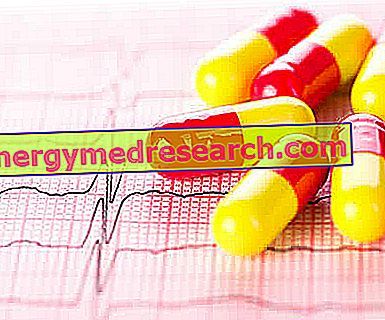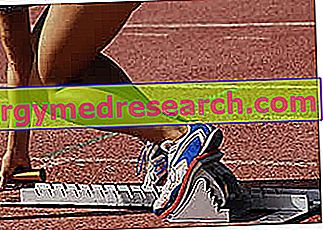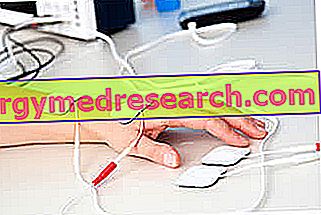Definition
The transient ischemic attack - also known by the acronym TIA - is a particular form of ischemic attack, which causes a temporary and reversible neurological deficit (unlike what happens in the stroke where the consequences are permanent).
Causes
The transient ischemic attack is caused by a reduced blood supply to a certain area of the brain. This cerebral ischemia can be caused by the presence of a clot (ie a thrombus) inside one of the cerebral arteries, which is, therefore, to be obstructed.
The factors that favor the formation of the thrombus can be: hypertension and other cardiovascular pathologies, diabetes, physical inactivity, obesity, the habit of smoking and / or alcohol, hormonal therapies, hypercholesterolemia and hypertriglyceridemia, advanced age and the possible presence of a family history of TIA.
Symptoms
The symptoms caused by the transient ischemic attack are very similar to those caused by the stroke and vary according to the area of the brain affected.
However, the main symptoms that can occur are paralysis and numbness of the face and limbs, difficulty walking and maintaining balance, difficulty with speech and sudden loss of vision.
This symptomatology is temporary and tends to resolve itself over a period of time ranging from a few minutes to a maximum of 24 hours.
Information on Transient Ischemic Attack - Drugs and Care is not intended to replace the direct relationship between health professional and patient. Always consult your doctor and / or specialist before taking Transient Ischemic Attack - Drugs and Care.
drugs
Despite its temporary and reversible character, the transient ischemic attack is not a phenomenon to be underestimated, as it can recur and can be an alarm signal indicating a possible risk of stroke.
Therefore, the TIA must be considered as a medical emergency and, as such, must be adequately and promptly treated.
Generally, the pharmacological therapy of the transient ischemic attack is based on the administration of antiplatelet agents, in such a way as to prevent platelet aggregation, therefore, the formation of thrombi.
The identification and subsequent treatment of the primary cause is also fundamental (for example, cardiovascular pathologies, diabetes, high cholesterol, etc.), which has favored the formation of the thrombus which, in turn, has caused the TIA.
Finally, the lifestyle and diet of patients play a fundamental role in preventing future transient ischemic attacks. Therefore, patients who have suffered from TIA must adopt a healthy lifestyle associated with a balanced diet and regular motor activity.

Acetylsalicylic acid
Acetylsalicylic acid (Cardioaspirin ®, Ascriptin ®) is a non-steroidal anti-inflammatory drug (or NSAID), but - if taken in small doses - it is able to exert an anti-platelet aggregation action.
Precisely for this reason, pharmaceutical preparations based on low-dose acetylsalicylic acid are the first-choice drugs in therapy against transient ischemic attack.
The dose of acetylsalicylic acid usually used to prevent the formation of blood clots is 75-100 mg a day, to be taken orally.
Dipyridamole
Dipyridamole (Persantin ®) is a platelet antiplatelet belonging to the class of phosphodiesterase inhibitors. Usually, this active ingredient is used in the prevention of thrombus embolism in patients with cardiac mechanical prostheses. However, there are prolonged release and high dose pharmaceutical formulations of dipyridamole, the use of which has been approved for the prevention of transient ischemic attacks.
The dose of dipyridamole usually used in the prevention of TIA is 400 mg, to be taken orally, in divided doses and preferably at mealtimes.
Dipyridamole can be administered either alone or in combination with acetylsalicylic acid.
ticlopidine
Ticlopidine (Tiklid ®) is a platelet antiplatelet belonging to the class of thienopyridines which can be used in therapy against transient ischemic attacks. Its effectiveness is similar to that of acetylsalicylic acid, however, the rather serious side effects it can cause (such as, for example, neutropenia and hemorrhages) limit its use, especially in the long term.
Ticlopidine is available for oral administration and is generally administered at a dose of 250-500 mg per day. However, the exact dosage schedule and duration of treatment must be established by the doctor.
Clopidogrel
Clopidogrel (Clopidogrel Teva ®, Plavix ®, Iscover ®, Clopidogrel Mylan ®) is a platelet antiplatelet also belonging to the class of thienopyridines which can be used in the treatment of transient ischemic attack, although it is not considered a drug of first choice .
It is available for oral administration and is generally taken at a dose of 75 mg of active ingredient per day.



